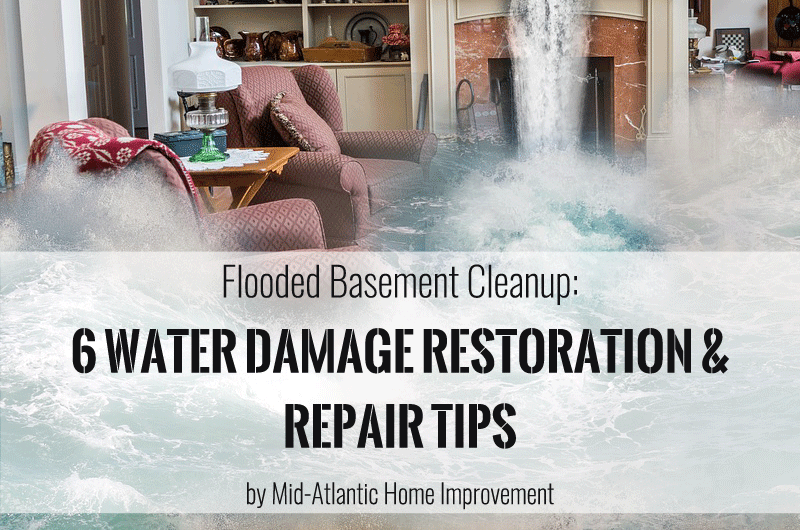
Dealing with post-flood water damage restoration, particularly in your basement, can be a daunting task. While minor issues can often be resolved by homeowners themselves, more extensive damage calls for the expertise of experienced restoration contractors.
Basements are the most flood-prone areas of a home, with major causes of basement flooding including foundation problems, severe storms and sewer backups.
Flooded Basement Cleanup: 6 Water Damage Restoration & Repair Tips for Homeowners
Minor water damage caused by slight flooding can usually be remedied on your own, especially if you keep the following considerations in mind:
Tip #1: Prioritize Safety with Protective Gear
Before diving into any water damage restoration efforts, safety should be your utmost concern. and if water has been in the basement for any length of time, you’ll need to protect yourself against the dangers posed by bacteria and the toxic mold that can form in highly humid and moist indoor areas.
These health risks can be serious, so be sure that everyone working in the basement has Personal Protective Gear (PPG), including face masks, gloves, and appropriate footwear. Your well-being is paramount.
Tip #2: Safeguard Against Electrical Hazards
Water and electricity are a deadly combination and ensuring a hazard-free environment is crucial. Before you start your repair tasks, cut your home’s power supply, then start by removing damaged or sensitive items, including:
- Electrical appliances
- Furniture
- Storage boxes
- Anything else that has been damaged
Tip #3: Efficient Water Removal
Effective water removal is the next critical step and there are three primary options for eliminating the water from your basement while handling restoration.
The first method is the old-school approach: remove it manually, using buckets, mops, and towels. This can be time-consuming and labor-intensive, but it is the least expensive.
Alternatively, if the situation allows, you can rent a wet-dry vacuum. However, you need to be very careful, as this will require that you turn the electricity back on so the vacuum has a power supply. Plug the wet-dry vacuum into a socket that is far away from any standing water. Be extra cautious with extension cords, as they could short-circuit, causing a potentially serious shock. Most experts recommend avoiding extension cords altogether in these situations.
If a wet-dry vacuum isn’t an option, you can also rent or purchase a sump pump. Once you’ve removed the water, set up a dehumidifier and use fans to dry things up.
Tip #4: Thorough Cleaning and Disinfection
After all affected areas are completely dry, you can move into the clean-and-disinfect phase.
You may need specialized cleaners that will be available at local DIY retailers. You’re aiming to wipe out bacteria as well as any mold that may have gained a foothold in moist, humid conditions.
Treat any area that was affected by the flooding, including walls and furniture. Upholstered furniture doesn’t generally recover well after a flood, and it may need to be discarded.
Tip #5: Remove Unsalvageable Items and Structures
Bacteria and toxic mold are more likely to grow in problematic quantities if they have a food source, and if conditions are right. Damaged walls, wood, furniture, and other items can all potentially contribute to their growth, so any element that cannot be repaired should be removed from your home.
In some cases, this can involve demolishing walls and other interior structures. If the scope of the project is too large for you to handle, consult a professional specializing in basement renovations & repairs, and talk to your home insurance provider to see if floods are on your list of covered perils. Many contractors will even handle insurance claims for you!
#6: Protect Your Basement Against Future Flooding
An ounce of prevention is worth a pound of cure, and that is especially true when it comes to basement flooding.
Some tips that will go a long way toward preventing a future flood include:
- placing a vent or hole in the basement wall where flooded water can flow out such as by the basement windows
- installing a sump pump
- installing a check valve for backup sewer
- keeping your rain gutters clean and extending rain gutter downspouts so that rainwater is carried further away from home
- hiring an excavation contractor to regrade your yard, so that water is properly directed away from your home
- maintaining your plumbing to make sure your pipes don’t leak or burst
- investing in a solid flood insurance plan so that you’re financially protected
Also, always store important and valuable items in higher places, making widespread use of waterproof storage bins, and stay vigilant about your spring cleaning every year to reduce clutter.
Water damage restoration demands a meticulous and strategic approach. By prioritizing safety, effective water removal, thorough cleaning, and preventive measures, homeowners can mitigate the impact of water damage and safeguard their homes against future flooding.
When in doubt, consult an experienced restoration contractor who specializes in the remediation and renovation of water-damaged areas. Your home’s resilience begins with preparedness and proactive care.
The Benefits of Hiring a Professional Restoration Contractor
Water damage restoration professionals possess extensive knowledge and experience in dealing with various types of water damage scenarios. They understand the complexities of water intrusion, the different categories of water damage, and the potential hidden issues that can arise during the restoration process.
Water damage can escalate quickly, leading to structural damage and mold growth within hours or days. Professionals have the resources and manpower to respond rapidly, minimizing the extent of damage and preventing further deterioration.
Rapid and effective drying is essential to prevent mold growth. Restoration experts have access to specialized equipment such as industrial-grade pumps, dehumidifiers, air movers, and moisture meters that are essential for efficient water removal, drying, and dehumidification. Professionals use moisture-detection tools to confirm that all moisture is removed, reducing the risk of mold infestation and subsequent health issues.
Additionally, many water damage restoration companies, including Mid-Atlantic, have experience working with insurance providers. We can assist homeowners in documenting the damage, estimating repair costs, and filing insurance claims, making the process smoother and maximizing coverage.
All in all, hiring a professional water restoration company provides peace of mind, knowing that experts are handling your restoration process and your home is protected.
Water Damage Restoration Contractor Since 1975!
Has your property been damaged by water, fire, mold, storms and other disasters? We can help you recover – call 804-647-0649!
Since 1975, Mid-Atlantic Home Improvement has been helping countless families overcome the devastating setbacks caused by fire damage, water damage, hail or snow damage, wind damage, vehicle damage, and other life-altering disasters.

We are a family-owned and operated Virginia general contractor with over 45 years of experience in construction, restoration and remodeling. Our dedication to your satisfaction is our number one priority!
Call (804) 647-0649!

Julius Wither Amberfield says
I can definitely agree with you when you said that water and electricity is not a very good combination and so it is important to cut the power supply off prior to working on the water damage. Your advice and tips were really great, however, I feel as though water damage restoration is not something that inexperienced people should do. Aside from that, I tried DIYing something once and ended up getting hurt. It might be a better idea to just hire a professional to deal with the water damages in the basement. Thank you.
Watson Williams says
I thought it was interesting to learn that it’s important to get the right protective gear when cleaning up water damage in a basement. I didn’t realize that water damage restoration could be so dangerous. I feel like this would be a good reason to let professionals handle your water damage restoration for you.
John Billows says
I like your step to clean and disinfect only after everything is fully dry. If there are still wet spots then when you clean up the germs can still spread through the remaining water. If my basement ever gets flooded I’ll remember to wait till it is dried, even though I’ll want to start cleaning up immediately. Thanks for the great tips.
Michael Robinson says
What you said about disconnecting your electricity when experiencing water damage is very important for your safety and for the home. As you explained right here, cutting your home’s power supply and removing damaged or sensitive items will help you not have to worry about damaging things when you are working to restore the condition of your property. With the winter right around the corner, I think that I will need to reinforce my roof in order to keep the water out. This will be my wife’s and my first winter together in our new home, so we have to prepare for the worst! Thanks for all the help!
Monroe Waterman says
I see you have the most important step listed first. I’ve seen too many homeowners try to tackle such a job in their own without taking the necessary steps to protect themselves. One more reason to leave it to the professionals.
Steele Honda says
I appreciate you pointing out that the first thing to do after the flood is to let the basement dry completely and not try to do anything there until there is no water. If my basement ever gets flooded I’ll remember to wait till it is dried, even though I’ll want to start cleaning up immediately. I think that it might be a good idea to have my basement waterproofed as I live in the area where floods happen quite often.